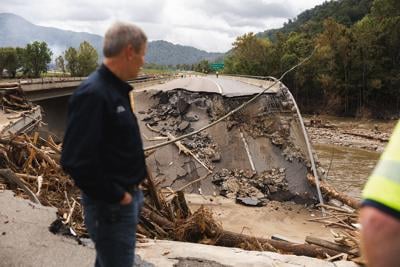The Tennessee legislature unanimously signed off on several measures related to storm relief during an otherwise contentious special session. While the special session's Disaster Relief Committee approved its bills with little dissent, the three-hour meeting saw frustration and intense emotion related to the delayed aid and dire economic distress facing rural communities in East Tennessee.
Days after the disaster, Lee made $100 million available in no-interest loans for local municipalities that suffered storm damage. Mayors traveled from East Tennessee for brief but emotional hearings about the continued damage, devastation, trauma and economic stress in their counties. Lawmakers acknowledged that the state will likely face more frequent and severe storms — without mentioning human-driven climate change — and set up various funds to relieve Helene’s economic burden and prepare for future disaster recovery.
Controversial legislation costs nearly half of $910 million budget passed for governor’s priorities
A new $110 million commitment continues Lee’s relief logic by covering 5 percent interest for three years on borrowing by local governments to address Helene recovery. Another $100 million seeds a zero-interest loan fund for future disaster recovery. The legislature approved $240 million more for Tennessee’s existing disaster relief fund — local governments can also draw from this to partially cover their required 12.5 percent match on federal aid money. Finally, the legislature sent $20 million to rebuild Hampton High School in Carter County, the only direct transfer of capital for storm destruction. The full fiscal note can be found here.
The committee began with introductions from first-term Rep. Renea Jones (R-Unicoi) and second-term Rep. Rebecca Alexander (R-Jonesborough), both of whom described lasting storm damage in their districts. The counties hit hardest by Helene — Unicoi, Carter, Cocke, Sevier, Jefferson, Greene — are among the states’ poorest.
“We have a saying in the northeast part of the state that sometimes we feel the state ends at Knoxville,” said chair Rep. Timothy Hill (R-Blountville) in opening remarks. “Today we have a tremendous opportunity to show them that that is not the case.”
Officially, the committee went out of session to hear testimony from a string of rural mayors in northeast Tennessee. They praised the extraordinary deeds of ordinary people — neighbors helping neighbors, first responders working overtime, everyone pitching in to help wherever it was needed.
“We need help,” said Johnson County Mayor Larry Potter, his voice rising and cracking. “Parkdale Mills, our largest employer — 410 people don’t have a job now. How do you tell those people what you’re going to do to help them?”
Ahead of a special session on education, Lee is moving several swing votes while their districts wait on flood relief money
“What these mayors, and myself, have experienced ... it is beyond imaginable what we’ve seen,” said Carter County Mayor Patty Woodbury. Soon her voice too started to break with emotion. “We are a small and economically distressed county already providing up-front funding for over $100 million for recovery that was never in our budget.”
Garland “Buddy” Evely, mayor of Unicoi County, followed.
“We do not have and cannot front the money,” Evely told lawmakers. “Our counties never ask for anything. I’m not begging for a handout. I’m just asking for a hand up. I know you all will do the right thing.”
Evely spoke to the Scene two weeks ago about the strong bond between the mayors of northeast Tennessee. After watching his neighboring mayors deliver their own pleas, tears soon hit Evely too.
“Please forgive me for being emotional,” he said. “I love my county and I love the people who live there, or I wouldn’t be doing what I’m doing.”
Democrats have questioned the interplay between disaster relief and the Education Savings Act, which benefited from a few critical votes from East Tennessee, since the two were announced as topics of the special session.
“We’ve got $2.1 billion in our rainy-day funds,” said Rep. Bo Mitchell (D-Nashville). "If a flood isn’t a rainy day, I don’t know what is, folks. ... We’ve waited and waited and waited until, I guess, [Gov. Lee has] the votes in line for something else.”
The 114th Tennessee General Assembly will consider education, immigration, guns and health care
Victims of Helene have also been victims of a belabored and convoluted aid strategy that has left many small municipalities in rural Appalachia on the hook for money they don’t have. Desperate testimony from local county mayors, most of whom spoke through tears, and widespread agreement on aid dollars from legislators prompted the most incisive question of the day: Why did Tennessee wait so long? With votes basically guaranteed, more and more Democrats used their time to hammer Lee and his party with this point.
Rob Mitchell, Gov. Lee’s deputy counsel, faced the question from Rep. Todd Warner (R-Chapel Hill) more than an hour into the meeting.
"I've got to ask the question that my colleague asked," Warner said. "Why has there not been a special session called already?"
“Maybe that is what should have happened,” responded Mitchell.








